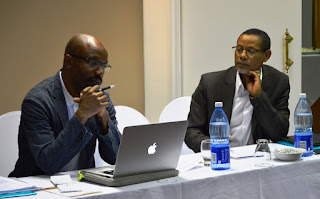“As you start walking, the way finds you”, this was the
quote which opened the recent workshop on ‘The Role and Place of African
Customary Law and Traditional Leadership in Constitutional Democracies – Civil
Society Perspectives’. The objectives were to learn from African regional
system and experiences about African Customary institutions and leadership, and
to understand civil society perspectives including those of women, youth,
elders, rural communities, and activists around the relevance and place of culture, its
institutions, and leadership in post-apartheid South Africa then to explore strengthening
the ‘Traditional
and Khoi-San Leadership Bill, 2015’. The South African Parliament has
enacted the Bill which will provide for the recognition of traditional and
Khoi-San communities, leadership positions and for the withdrawal of such
recognition. The workshop was organised and hosted by Natural Justice with the
support from OSISA
and the Heinrich Boell Foundation.
 |
| Dr. Albert Barume & Mr. Stan Henkeman |
The workshop began with a framing by Natural Justice’s Lesle
Jansen, followed by a session setting out the issues around the Bill by Dr.
Ademole Jegede, University of Venda. A keynote address on ‘Indigenous Peoples
and local communities and their customary institutions within the African
regional system’ was then presented by Dr. Albert Barume, United
Nations Expert Mechanism on Rights of Indigenous Peoples and Expert Member
of the African
Commissions’ Working Group on Indigenous Populations. Dr. Barume outlined
how Africa is currently “re-booting” itself, and shifting from the decades long
perspective of building culturally homogenous nation states to recognizing and
respecting cultural diversity and allowing it to flourish within a democratic
system. He outlined how traditional values and institutions are beginning to be
realized with the legal and policy frameworks of the African Union, and that
the AU’s ‘Agenda 2063 – the Future
we want for Africa’ highlights the importance of African culture and
traditions for development. Mr. John Nakuta, Director Human Rights
Documentation Centre, Namibia then discussed experiences from post-independent
Namibia regarding traditional authorities, their constitutional and statutory
recognition, power, duties, functions, government support and challenges. He
outlined the importance that traditional authorities be apolitical, must be
consistent with all human rights and guard against tribalism.
 |
| Panel Discussion: Mr. Zenzile Khoisan, Ms. Constance Mogale, Mr. Henk Smit, Mr. Ivan Vaalboi & moderator Mr. Delme Cupido (OSISA) |
During the second day of the workshop civil society perspectives
on culture and traditional leadership were shared through a series of panel
discussions, these included youth, women, elders, a traditional healer, and
activists. Issues that surfaced included recognition for the Khoi and San,
restitution and restoration, land, whether the bill undermines or promotes
culture and custom, political objectives of the bill, that the bill may
reinforce apartheid boundaries, and concerns around elite capture. The bill
provides for the long overdue recognition of Khoi and San people, and the bill
has currently been passed from government to Parliament. There will shortly be
public consultations on the bill and the discussions from the workshop will be
further developed into a policy brief for submission.
